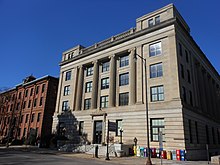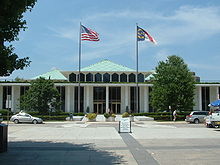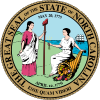Government of North Carolina
Government of North Carolina | |
|---|---|
 | |
| Polity type | Presidential System |
| Constitution | Constitution of North Carolina |
| Legislative branch | |
| Name | General Assembly |
| Type | Bicameral |
| Meeting place | North Carolina State Legislative Building |
| Upper house | |
| Name | Senate |
| Presiding officer | Mark Robinson, President |
| Lower house | |
| Name | House of Representatives |
| Presiding officer | Tim Moore, Speaker |
| Executive branch | |
| Head of State and Government | |
| Title | Governor |
| Currently | Roy Cooper |
| Appointer | Election |
| Cabinet | |
| Name | Cabinet |
| Leader | Governor |
| Deputy leader | Lieutenant Governor |
| Headquarters | State Capitol |
| Judicial branch | |
| Name | Judiciary of North Carolina |
| Courts | Courts of North Carolina |
| North Carolina Supreme Court | |
| Chief judge | Paul Martin Newby |
| Seat | Law and Justice Building, Raleigh |
The government of North Carolina is divided into three branches: executive, legislative, and judicial. These consist of the Council of State (led by the Governor), the bicameral legislature (called the General Assembly), and the state court system (headed by the North Carolina Supreme Court). The Constitution of North Carolina delineates the structure and function of the state government.[1][2][3]
Executive branch[]
North Carolina's executive branch is governed by Article III of the state constitution. The first North Carolina Constitution in 1776 called for a governor and a seven member Council of State elected by the legislature. Currently, the ten-member Council of State of North Carolina includes the following members elected by voters:[1][2][3][4][5][6]

The nine North Carolina Cabinet departments, headed by department secretaries, plus the Department of Administration, are appointed by the Governor are as follows:[4]
- Department of Administration,
- Department of Commerce,
- Department of Natural and Cultural Resources,
- Department of Environmental Quality,
- Department of Health and Human Services,
- Department of Information Technology
- Department of Revenue,
- Department of Public Safety,
- Department of Military and Veterans Affairs,[7]
- Department of Transportation.
The North Carolina Register includes information about state agency rules, administrative rules, executive orders and other notices, and is published bimonthly.[8][9] The North Carolina Administrative Code (NCAC) contains all the codified rules.[8]
Legislative branch[]



The legislature derives its authority from Article II of the North Carolina Constitution.[3] The North Carolina General Assembly is the state legislature. Like all other states except for Nebraska, the legislature is bicameral, currently consisting of the 120-member North Carolina House of Representatives[10] and the 50-member North Carolina Senate. The lieutenant governor is the ex officio president of the state Senate. The Senate also elects its own president pro tempore and the House elects its speaker. Its session laws are published in the official and codified as the .[8][11][12]
The first North Carolina General Assembly was convened on April 7, 1777 in New Bern, North Carolina. It consisted of a Senate, which had one member from each of 37 counties (regardless of population) and Washington District (became part of Tennessee in 1796), and a House of Commons, which had two members representing each county, plus one each from six districts or boroughs (Edenton, Halifax, Hillsborough, New Bern, Salisbury, and Wilmington). Only land-owning (100 acres for the House of Commons, 300 acres (1.2 km2) for the Senate), Protestant men could serve. The first legislature elected the Governor, Richard Caswell. The legislature was more powerful compared to the executive branch in the early government.[1]
Judiciary[]

North Carolina's current judicial system was created in the 1960s after significant consolidation and reform.[13] The judicial system derives its authority from Article IV of the North Carolina Constitution.[3] The state court system is led by the Supreme Court of North Carolina, the state supreme court, which consists of seven justices. The North Carolina Court of Appeals is the state's intermediate appellate court and consists of fifteen judges who rule in rotating panels of three. Together, the Supreme Court and Court of Appeals constitute the appellate division of the court system.[14]

The trial division includes the Superior Court and the District Court. The Superior Court is the state trial court of general jurisdiction; all felony criminal cases, civil cases involving an amount in controversy in excess of $25,000, and appeals from the District Court are tried (de novo review) in Superior Court. A jury of 12 hears the criminal cases.
The District Court is a court of limited jurisdiction. It has original jurisdiction over family law matters (divorce, child custody, child support); civil claims involving less than $25,000; criminal cases involving misdemeanors and lesser infractions; and juvenile cases involving children under the age of 16 who are delinquent and children under the age of 18 who are undisciplined, dependent, neglected, or abused. Magistrates of the District Court may accept guilty pleas for minor misdemeanors, accept guilty pleas for traffic violations, and accept waivers of trial for worthless check and other charges. In civil cases, the magistrate is authorized to try small claims involving up to $10,000 including landlord-tenant and eviction cases. Magistrates also perform civil marriages. District Court only conducts bench trials, with no jury.
Local government[]
Local governments in North Carolina primarily consist of counties, cities, and towns.[15] North Carolina has 100 counties and more than 500 municipalities. Municipalities are only able to exercise the authority that the General Assembly explicitly gives them since
Unlike most other states, North Carolina does not grant broad authority over local matters to local governments through its state constitution or a single state statute. Instead, North Carolina local governments derive their authority from a “patchwork of local and general laws.” These laws include “numerous general statutes” laying out the general powers of all local governments and local acts that apply only to a given municipality or set of municipalities. In some cases, the charter establishing a particular local government provides that government with additional authority.[16]
The General Assembly's authority to create local governments comes from Article VII of the Constitution of North Carolina.[3]
County governments in North Carolina include the following officials:[15]
- Sheriffs
- County commissioners
- District attorneys
- Justices of the Peace (historical)
- North Carolina register of deeds
- North Carolina clerk of court (historical)
- Alcoholic Beverage Control Board
- Board of Education
- Board of Elections
- Public Health Board
- Mental Health Board
- Social Services Board
Current Council of State officials[]
The 2019 elected ten-member Council of State of North Carolina is composed of:

Josh Stein (D)
Attorney General
Elaine Marshall (D)
Secretary of State
Dale Folwell (R)
State Treasurer
Beth Wood (D)
State Auditor
See also[]
References[]
- ^ a b c "North Carolina Constitution of 1776". Yale Law School. 1776. Retrieved September 4, 2019.
- ^ a b "The 1868 constitution". Learn NC. Retrieved March 5, 2017.
- ^ a b c d e "Constitution of North Carolina, 1971". North Carolina General Assembly.
- ^ a b "Executive Branch". NCPedia.org. Retrieved September 11, 2019.
- ^ Marshall, Ellaine F. (2001). North Carolina Manual. North Carolina Secretary of State.
- ^ "Article III of the North Carolina State Constitution of 1971". 1971. Retrieved September 11, 2019.
- ^ "NC Governor Roy Cooper". governor.nc.gov. Retrieved 11 April 2018.
- ^ a b c "N.C. State Statutes, County and Municipal Ordinances". University of North Carolina Kathrine R. Everett Law Library. Retrieved 10 April 2014.
- ^ "North Carolina Register". www.oah.nc.gov. Retrieved December 6, 2019.
- ^ called the House of Commons until 1868 when it was change in the North Carolina Constitution
- ^ "North Carolina Government". NC.GOV. Retrieved September 11, 2019.
- ^ "Session Laws". ncgovdocs.org. Retrieved December 6, 2019.
- ^ Fleer 1994, p. 132.
- ^ Williams, Wiley J. (2006). "State Judiciary". NCPedia.org. Retrieved September 11, 2019.
- ^ a b Whittaker, Gordon (June 2012). Local Government in North Carolina (PDF) (4th ed.). Chapel Hill: UNC School of Government and the North Carolina City and County Management Association. Retrieved 18 May 2019.
- ^ Miles, Jeffrey (2018). "Searching Everywhere for a Section 24(1)(a) Standard: City of Asheville, Town of Boone, and the Unclear Future of Local-State Relations in North Carolina" (PDF). North Carolina Law Review. 96 (6): 1882.
Works cited[]
- Fleer, Jack D. (1994). North Carolina Government & Politics. Lincoln: University of Nebraska Press. ISBN 9780803268852.
External links[]
- "North Carolina Government". NC.gov. Retrieved September 11, 2019.
- Government of North Carolina
- State governments of the United States









